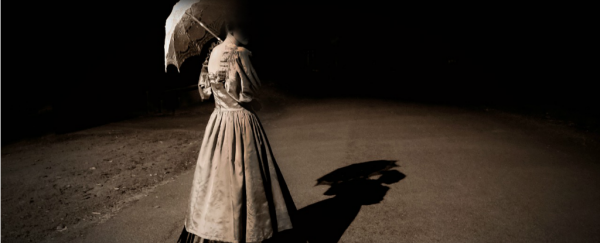Do you still feel scared?

The Spookiest Thing This Halloween Is The Number of Americans Who Still Believe in GhostsBut actually.SCIENCE AF STAFF29 OCT 2017On Halloween we all like to get a little bit spooked. For most fully-grown adults, in order to get really scared we have to suspend our disbelief in the paranormal. When we watch a scary movie or run through the halls of a haunted house, we set aside realism and logic for the sake of enjoyment.
Others don't have to work so hard. A terrifying number of adults out there actually believe in the paranormal. In fact, a whopping 37 percent of Americans believe that houses can be haunted and 32 percent believe in ghosts or the spirits of dead people,according to a Gallup survey.Even worse - an eerie number of people say they have witnessed paranormal activity with their own two eyes. In fact, nearly one in five American adults believe they have seen or been in the presence of a ghost, according to a 2009 Pew Research Center Survey.These statistics shouldn't really surprise you. Especially in a country where only a quarter of all Americans trust there is scientific consensus on human-caused climate change.
Still, it makes you wonder, "How can so many people believe something that is so illogical?"Psychologists have been plagued by this question for decades, and several theories have been put forward to explain why people continue to believe in the paranormal despite the lack of evidence. One explanation is that supernatural phenomena are just another way for people to make sense of the world. When there is no obvious explanation for something (or when people can't be bothered to look up the science), some people infer a causal relationship between two seemingly unrelated events. In other words, our brains simply make up an explanation. Psychologists call this 'illusory pattern perception,' which is a nice way of saying 'irrational thought.'While we are all guilty of doing this from time to time, a recent studyfound this type of thinking goes into overdrive in certain types of people."We conclude that illusory pattern perception is a central cognitive ingredient of beliefs in conspiracy theories and supernatural phenomena," the authors write.
It gets scarier.Some research has even shown that illusory pattern perceptions can make you actively doubt sound logic. For example, one study found a 2-minute conspiracy video clip can significantly decrease a viewer's acceptance of science.This means that a belief in the supernatural could actively be making people less intelligent about science.But illustory pattern perception is not always harmful. In fact, some psychologists theorize that a belief in the paranormal – like religion – improves mental health and social cohesion. There are even some studies that have found an association between supernatural beliefs and improved social cooperation. Psychologists theorize that these beliefs exist because they provide an evolutionary benefit. By shielding you from the harsher truths of life, supernatural beliefs can provide you with hope in life-after-death and the human spirit. The argument follows that these beliefs make you a happier and more cooperative member of the public.Obviously, there is no scientific evidence to prove the existence of ghosts or spirits, but is there any evidence to disprove their existence?Theoretical physicist Bryan Cox certainly thinks so.Recently, Cox explained that there is no room in the Standard Model of Physics for a substance or medium that can carry on our information after death and yet go undetected by the Large Hadron Collider.When he first offered this theoretical explanation, astrophysicist Neil deGrasse Tyson, who was in the room, asked, "If I understand what you just declared, you just asserted that CERN, the European Center for Nuclear Research, disproved the existence of ghosts.""Yes," confirmed Cox.Nevertheless, it seems unlikely that this mind-blowing argument will convince the many Americans who believe in supernatural phenomena.For now, all we can really do is lament the fact that too many Americans believe in ghosts and not enough believe in science itself.